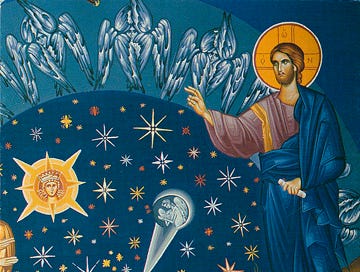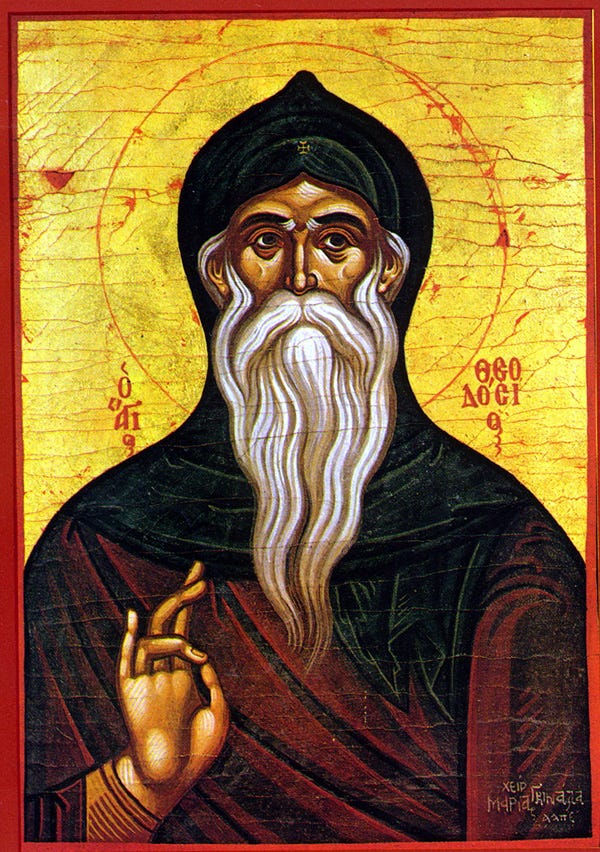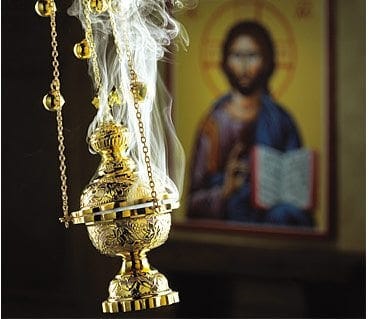"The mind ascends to god not through the accumulation of knowledge, but through the letting go of all that it knows."
St. Gregory of Nyssa
Daily Scripture Readings
Ephesians 2:11-13
Therefore remember that at one time you Gentiles in the flesh, called the uncircumcision by what is called the circumcision, which is made in the flesh by hands — remember that you were at that time separated from Christ, alienated from the commonwealth of Israel, and strangers to the covenants of promise, having no hope and without God in the world. But now in Christ Jesus you who once were far off have been brought near in the blood of Christ.
Luke 13:18-29
The Lord said, “What is the kingdom of God like? And to what shall I compare it? It is like a grain of mustard seed which a man took and sowed in his garden; and it grew and became a tree, and the birds of the air made nests in its branches.” And again he said, “To what shall I compare the kingdom of God? It is like leaven which a woman took and hid in three measures of flour, till it was all leavened.” He went on his way through towns and villages, teaching, and journeying toward Jerusalem. And some one said to him, “Lord, will those who are saved be few?” And he said to them, “Strive to enter by the narrow door; for many, I tell you, will seek to enter and will not be able. When once the householder has risen up and shut the door, you will begin to stand outside and to knock at the door, saying, ‘Lord, open to us.’ He will answer you, ‘I do not know where you come from.’ Then you will begin to say, ‘We ate and drank in your presence, and you taught in our streets.’ But he will say, ‘I tell you, I do not know where you come from; depart from me, all you workers of iniquity!’ There you will weep and gnash your teeth, when you see Abraham and Isaac and Jacob and all the prophets in the kingdom of God and you yourselves thrust out. And men will come from east and west, and from north and south, and sit at table in the kingdom of God.”
Venerable Theodosius the Great, the Cenobiarch
Saint Theodosius the Great lived during the fifth-sixth centuries, and was the founder of cenobitic monasticism. He was born in Cappadocia of pious parents. Endowed with a splendid voice, he zealously toiled at church reading and singing. Saint Theodosius prayed fervently that the Lord would guide him on the way to salvation. In his early years he visited the Holy Land and met with Saint Simeon the Stylite (September 1), who blessed him and predicted future pastoral service for him.
Yearning for the solitary life, Saint Theodosius settled in Palestine into a desolate cave, in which, according to Tradition, the three Magi had spent the night, having come to worship the Savior after His Nativity. He lived there for thirty years in great abstinence and unceasing prayer. People flocked to the ascetic, wishing to live under his guidance. When the cave could no longer hold all the monks, Saint Theodosius prayed that the Lord Himself would indicate a place for the monks. Taking a censer with cold charcoal and incense, the monk started walking into the desert.
At a certain spot the charcoal ignited by itself and the incense smoke began to rise. Here the monk established the first cenobitic monastery, or Lavra (meaning “broad” or “populous”). Soon the Lavra of Saint Theodosius became renowned, and up to 700 monks gathered at it. According to the final testament of Saint Theodosius, the Lavra rendered service to neighbor, giving aid to the poor and providing shelter for wanderers.
Saint Theodosius was extremely compassionate. Once, when there was a famine in Palestine and a multitude of people gathered at the monastery, the monk gave orders to allow everyone into the monastery enclosure. His disciples were annoyed, knowing that the monastery did not have the means to feed all those who had come. But when they went into the bakery, they saw that through the prayers of the abba, it was filled with bread. This miracle was repeated every time Saint Theodosius wanted to help the destitute.
At the monastery, Saint Theodosius built a home for taking in strangers, separate infirmaries for monks and laymen, and also a shelter for the dying. Seeing that people from various lands gathered at the Lavra, the saint arranged for services in the various languages: Greek, Georgian and Armenian. All gathered to receive the Holy Mysteries in the large church, where divine services were chanted in Greek.
During the reign of the Byzantine Emperor Anastasius (491-518) there arose the heresy of Eutychius and Severus, which recognized neither the sacraments nor the clergy. The emperor accepted the false teaching, and the Orthodox began to suffer persecution. Saint Theodosius stood firmly in defense of Orthodoxy and wrote a letter to the emperor on behalf of the monks, in which they denounced him and refuted the heresy with the teachings of the Ecumenical Councils. He affirmed moreover, that the desert-dwellers and monks would firmly support the Orthodox teaching. The emperor showed restraint for a short while, but then he renewed his persecution of the Orthodox. The holy Elder then showed great zeal for the truth. Leaving the monastery, he came to Jerusalem and in the church, he stood at the high place and cried out for all to hear: “Whoever does not honor the four Ecumenical Councils, let him be anathema!” For this bold deed the monk was sent to prison, but soon returned after the death of the emperor.
Saint Theodosius accomplished many healings and other miracles during his life, coming to the aid of the needy. Through his prayers he once destroyed the locusts devastating the fields in Palestine. Also by his intercession, soldiers were saved from death, and he also saved those perishing in shipwrecks and those lost in the desert.
Once, the saint gave orders to strike the semandron (a piece of wood hit with a mallet), so that the brethren would gather at prayer. He told them, “The wrath of God draws near the East.” After several days it became known that a strong earthquake had destroyed the city of Antioch at the very hour when the saint had summoned the brethren to prayer.
Before his death, Saint Theodosius summoned to him three beloved bishops and revealed to them that he would soon depart to the Lord. After three days, he died at the age of 105. The saint’s body was buried with reverence in the cave in which he lived at the beginning of his ascetic deeds.
Spiritual Wisdom from St. Nectarios of Aegina
Tradition
Sacred TRADITION is the very CHURCH; without the Sacred TRADITION the CHURCH does not exist. Those who deny the Sacred TRADITON deny the Church and the preaching of the Apostles.
Before the writing of the Holy Scriptures, that is, of the sacred texts of the Gospels, the Acts and the Epistles of the Apostles, and before they were spread to the churches of the world, the CHURCH was based on Sacred Tradition....The holy texts are in relation to Sacred Tradition what the part is to the whole.
The CHURCH Fathers regard Sacred Tradition as the safe guide in the interpretation of Holy Scripture and absolutely necessary for understanding the truths contained in the Holy Scripture. The CHURCH received many traditions from the Apostles... The constitution of the church services, especially of the Divine Liturgy, the holy Mysteria themselves and the manner of performing them, certain prayers and other institutions of the Church go back to the Sacred Tradition of the Apostles.
In their conferences, the Holy Synods draw not only from Holy Scriptures, but also from Sacred Tradition as from a pure fount. Thus, the Seventh Ecumenical Synod says in the 8th Decree: "If one violates any part of the CHURCH Tradition, either written or unwritten, let him be anathema."
This week’s calendar reminders:
Monday 1/6: Holy Theophany Festal Divine Liturgy 9:15 am
Tuesday 1/7: no services or events
Wednesday 1/8: no services or events
Thursday 1/9: Matins 8:30 am
Friday 1/10: Matins 8:30 am
Saturday 1/11: Catechumen Class 4:30pm; Great Vespers 6 pm
Sunday 1/12: Divine Liturgy 9:15am











